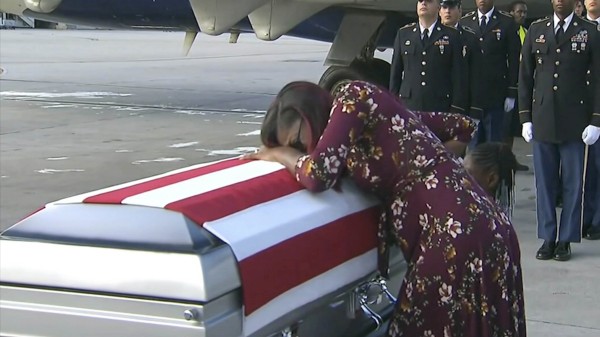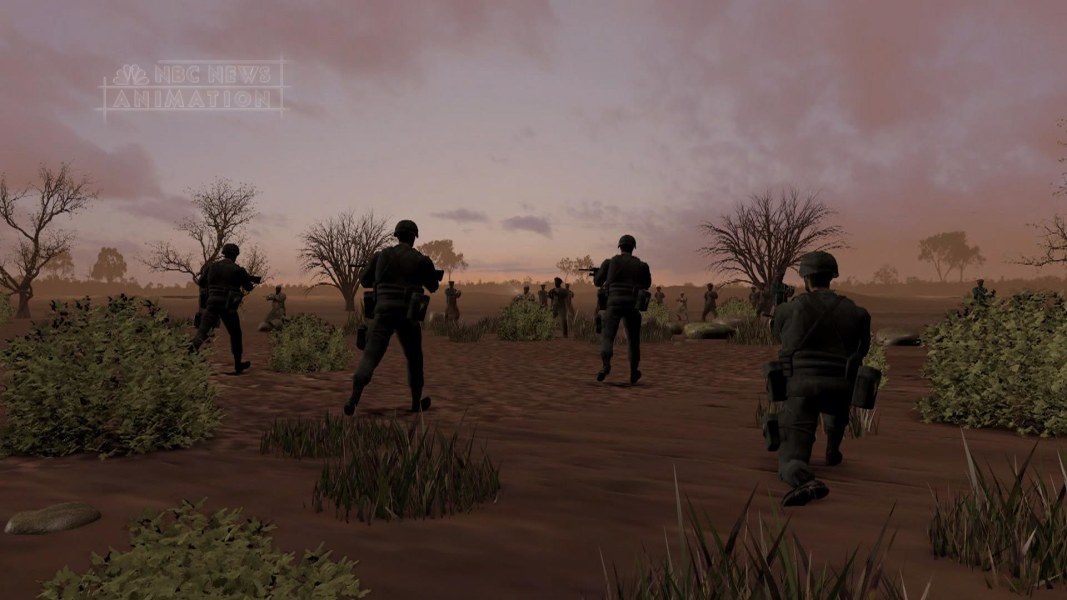Did the U.S. Intelligence Community Sabotage the Niger Mission to Embarrass Trump?
Niger Ambush Came After ‘Massive Intelligence Failure,’ Source Says
by KEN DILANIAN and COURTNEY KUBE
NBC NEWS
WASHINGTON — A senior congressional aide who has been briefed on the deaths of four U.S. servicemen in Niger says the ambush by militants stemmed in part from a “massive intelligence failure.”
The Pentagon has said that 40 to 50 militants ambushed a 12-man U.S. force in Niger on Oct. 4, killing four and wounding two. The U.S. patrol was seen as routine and had been carried out nearly 30 times in the six months before the attack, the Pentagon has reported.
The aide, who spoke on condition of anonymity because he is not authorized to speak publicly, said the House and Senate armed services committees have questions about the scope of the U.S. mission in Niger, and whether the Pentagon is properly supporting the troops on the ground there.
There was no U.S. overhead surveillance of the mission, he said, and no American quick-reaction force available to rescue the troops if things went wrong. If it weren’t for the arrival of French fighter jets, he said, things could have been much worse for the Americans.
Congress also has many unanswered questions about what happened, he said, including about the specifics of the mission that day and the accounts lawmakers have been given about the timeline of the attack and rescue.
The aide said questions are being asked about whether the U.S. soldiers were intentionally delayed in the village they were visiting. He said they began pursuing some men on motorcycles, who lured them into a complex ambush. The enemy force had “technical” vehicles — light, improvised military vehicles — and rocket-propelled grenades, the official said.
After the rescue when it became clear that one soldier was missing, “movements and actions to try and find him and bring him back were considered. They just were not postured properly [to get him].” The body of Sgt. La David Johnson was not recovered until nearly 48 hours after the Oct. 4 attack.
A Pentagon spokesperson called the claim of an intelligence failure “speculation.”
“An investigation is underway,” said the spokesperson. “At the conclusion of the investigation, we will provide further details.”
On Thursday, Director of the Joint Chiefs of Staff Lt. Gen. Kenneth McKenzie said that “every tactical engagement doesn’t necessarily proceed from an intelligence failure. We’ll look at it and we’ll come to conclusions about how intelligence could have supported adequately or inadequately the engagement that occurred. But on a battlefield, the enemy gets a vote.”
“Sub-Saharan Africa is a very difficult place to operate,” said Gen. McKenzie.
On Friday afternoon, Defense Secretary James Mattis met with Sen. John McCain, R-Ariz., chairman of the Senate Armed Services Committee, to discuss the Niger raid.
Earlier this week, McCain said the committee had not been provided with the information about the Niger mission that it “deserves.”
 Myeshia Johnson cries over the casket of her husband, Sgt. La David Johnson, who was killed in an ambush in Niger, upon his body’s arrival in Miami, on Oct. 17, 2017. WPLG / AP
Myeshia Johnson cries over the casket of her husband, Sgt. La David Johnson, who was killed in an ambush in Niger, upon his body’s arrival in Miami, on Oct. 17, 2017. WPLG / AP
Sen. Lindsay Graham, R-S.C., told reporters Friday that it’s too early to say whether there was an intelligence failure, “but that’s exactly the kind of questions we should be asking ourselves.”
He said Congress will require more information from a Trump administration that is expanding counterterrorism operations across the globe.
Trump is loosening the rules of engagement when it comes to lethal action against terrorists, and expanding the counterterrorism fight to different parts of the world, including across Africa, Graham said.
“The war is morphing,” he said. “You’re going to see more actions in Africa, not less.”
In that context, Graham said, “I will insist that Congress is informed more often and in more detail,” about military operations.
He added, “As the war expands, as the military had more authority, Congress is going to require more information.”
Pentagon officials say operations in the region have already “tightened up” and there’s been an operational “pause” while the U.S. military’s Africa Command (AFRICOM) assesses the situation. U.S. officials believe the attack was carried out by a local terror group that claims association with ISIS.
Gen. Thomas Waldhauser, commander of AFRICOM since 2016, told Congress in March that only 20 to 30 percent of AFRICOM’s needs for “intelligence, surveillance and reconnaissance” flights were being met. The Marine Corps general said there weren’t enough helicopters to find wounded or dead soldiers, and that African partners weren’t able to help with recovery missions.
“For personnel recovery,” he said, “Africa Command relies heavily on contract search and rescue assets.”
___
http://www.nbcnews.com/news/africa/source-niger-attack-resulted-massive-intelligence-failure-n812626
